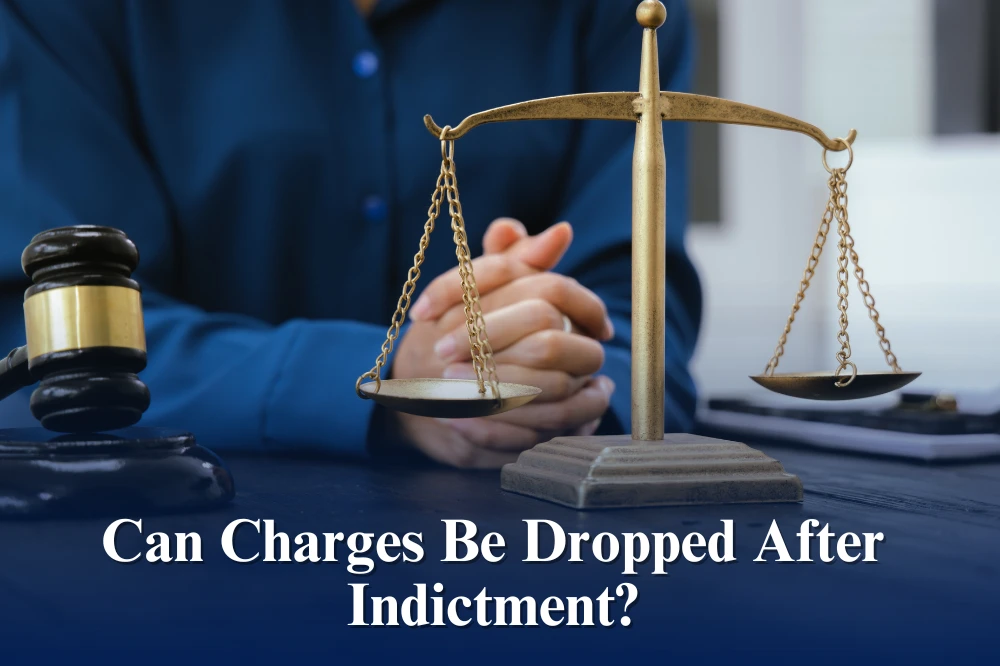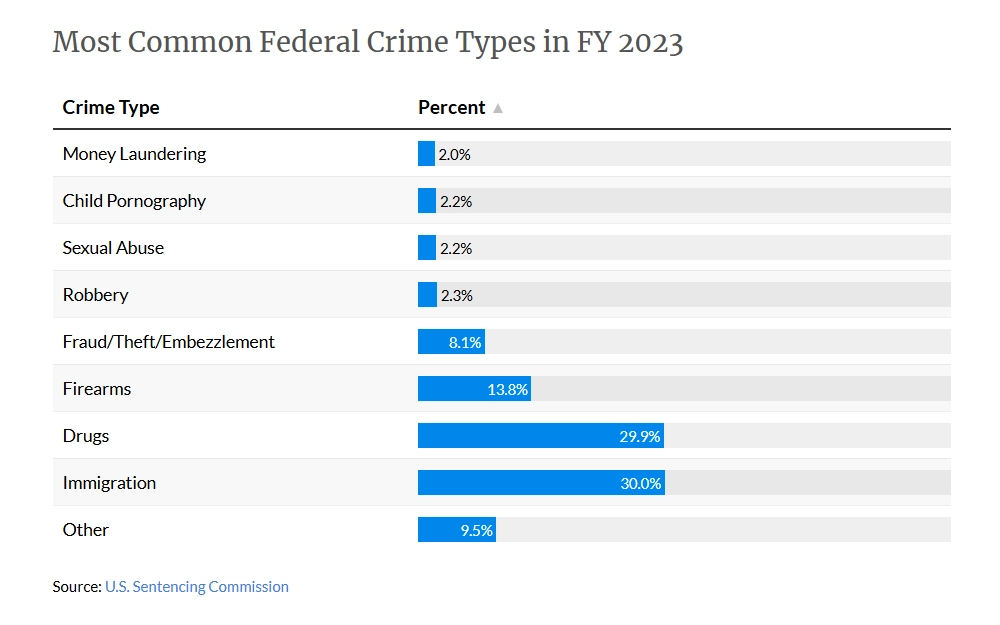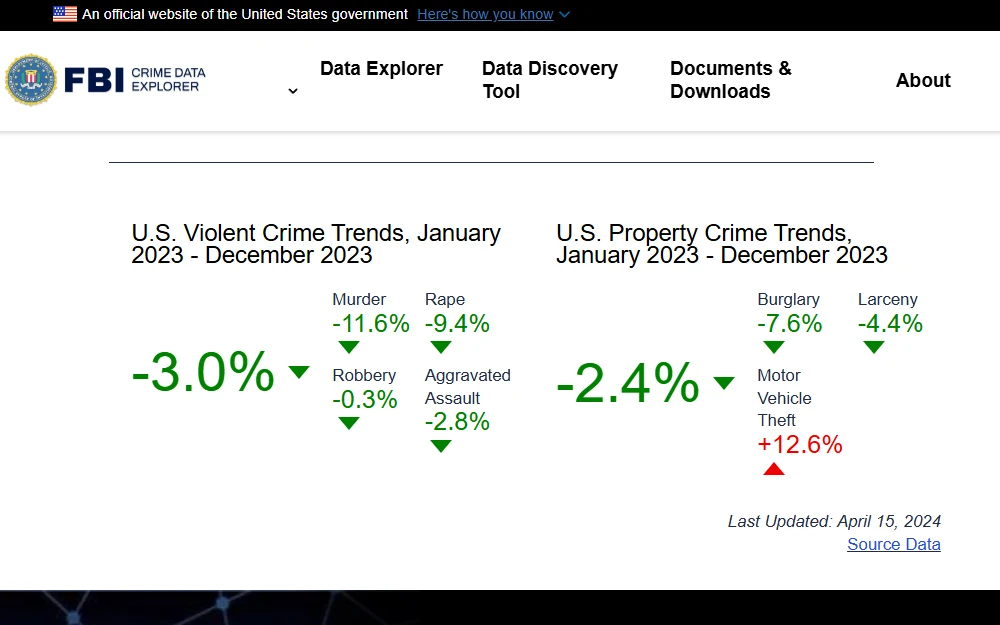
Individuals going through court proceedings after being accused of a crime often wonder if charges can be dropped after an indictment.
While receiving an indictment doesn’t guarantee a conviction, it can be a daunting experience for the defendant, as it indicates that the grand jury has found enough evidence to formally charge the person with a crime and move the case to trial.
However, this could be an opportunity for the defendant to challenge the evidence, receive protection against unjust charges, and potentially avoid conviction.
This resource examines the factors and strategies that may influence the decision of the prosecutor to drop a charge post-indictment, the importance of having a skilled criminal defense attorney to help the defendant throughout the case, and other legal avenues available for those caught in this stressful situation.
Dropping Charges After an Indictment: Is It Possible?
Indictment – otherwise known as a true bill or presentment – is a formal charge or accusation (not a conviction) of a serious criminal offense declared by a grand jury, which allows the case to proceed to a trial.1
Being indicted on federal or state charges means that a grand jury has found sufficient evidence to formally charge the defendant with a crime.
While an indictment is a significant step in criminal proceedings, it doesn’t guarantee a conviction; in fact, these charges can end up being dropped, dismissed, or reduced as part of a plea bargain depending on several factors – such as the strength of the evidence, the nature of the charges, the defendant’s legal strategy, and the legal representation.2
Though an indictment does not imply guilt, it does indicate that a grand jury believes there’s enough evidence to move forward with a trial, highlighting the potential severity of the situation.
The next sections will further discuss common federal and state charges, factors influencing the decision to drop charges after indictment, and the significance of having a skilled criminal defense attorney.
Common Federal & State Charges That Require Grand Jury Indictment
Most federal felonies require an indictment issued by a grand jury, usually consisting of 16 to 23 grand jurors, after they review the evidence presented by a prosecutor that can serve as a safeguard of the accused against unwarranted criminal charges.3

However, there are some exceptions, such as when the defendant waives the right to an indictment or for certain misdemeanor cases.
Below is the list of the most common federal felonies that require indictment.
- Murder (18 U.S.C. § 1111): Typically, first degree and felony murder (killing during the act of another felony, like in the process of a robbery).4
- Drug Trafficking (21 U.S.C. § 841): Large-scale drug trafficking offenses, particularly those involving the distribution of controlled substances or the manufacturing of drugs.
- Kidnapping (18 U.S.C. § 1201): Kidnapping, particularly when crossing state lines or when it involves a federal offense – including kidnapping for ransom money.
- Bank Robbery & Other Robberies (18 U.S.C. § 2113): Bank robbery can require grand jury indictment when it involves using force or threats; other types of robbery may also fall into this category, especially those involving interstate commerce.
- Firearm Offenses (18 U.S.C. § 924(c)): Using a firearm in connection with a violent crime, such as assault or robbery.
- Fraud & Financial Crimes (18 U.S.C. § 1343 & § 1344): Serious federal financial crimes including bank fraud, wire fraud, and money laundering.
- Child Exploitation & Child Pornography (18 U.S.C. § 2251): Child exploitation offenses including producing or distributing child pornography.
- Terrorism-Related Offenses (18 U.S.C. § 2339A): Terrorism-related offenses, such as providing material support to terrorist organizations or carrying out acts of terrorism.

Using grand jury indictments in state courts varies by jurisdiction. Some states require a grand jury indictment for more serious crimes, such as felony charges (except if the defendant waives the right to one), while other states can proceed with prosecutors filing charges directly.
A state indictment is similar to the federal process, wherein it formalizes criminal charges and triggers the legal proceedings for a trial if there’s enough evidence to do so.
The most common state felony charges that require grand jury indictment before formal charges are filed include the following:
- Murder (first-degree murder, aggravated murder, and sometimes second-degree murder)
- Kidnapping
- Rape & Sexual Assault
- Arson (aggravated)
- Robbery (aggravated or armed)
- Drug Trafficking
- Gang-Related Offenses (criminal gang activity and other violent offenses committed as part of a gang, such as murder or assault)
- Human Trafficking
- Attempted Murder
- Felony Assault (aggravated)

It’s very important to verify specific laws within each state, as they can change or vary in application. For example, some states require grand jury indictments for all felonies (like in Georgia, New York, and Kentucky), while others require them for most felonies (like in Alabama, Ohio, and Texas), or just for most serious felonies (like in Missouri and Tennessee).
Using grand jury indictments in other states are also optional and can instead be filed by information – a written accusation presented by a prosecutor instead of a grand jury.7
Legal Strategies for Dropping Charges After Indictment
The process of dropping charges after an indictment involves multiple parties within the criminal justice system, but the grand jury’s active role in the criminal justice process concludes with the focus shifting to the trial case where a petit jury takes over assessing one’s guilt or innocence.
The prosecutor holds the primary authority to continue or drop criminal charges guided by principles of justice, public interest, and the strength of evidence available.
Prosecutors may drop or dismiss charges for various reasons, including but not limited to: insufficient evidence, procedural issues, witness issues, and new evidence. They can formally request the dismissal through motions filed with the court supported by relevant criminal procedural rules.8
The defense attorney guides the defendant through the legal process, advising them on the viability of seeking charge dismissal, and the best legal strategies and actions to employ based on the specifics of the case – such as filing pretrial motions, negotiations and plea bargaining, presenting evidence, and even challenging indictments.
In some jurisdictions, and for certain types of cases, the consent of the crime victim may be required for the prosecution to succeed; and, if the victim decides to drop charges, the prosecutor may be inclined to comply. However, prosecutors are bound by their duty to seek justice especially in cases of serious offenses or where public interest is at stake, which may involve pursuing charges even if the victim prefers to withdraw their cooperation.
Successful post-indictment dismissal of charges requires a strategic and well-informed approach tailored to the unique circumstances of each case. Below are key legal defense attorney strategies commonly utilized to pursue dropping charges after indictment.
Motion To Dismiss: A motion to dismiss is a formal request to the court to terminate the case before it proceeds to trial with grounds such as a clear lack of evidence, procedural errors (like mistakes in the indictment process or violations of legal procedures), and jurisdictional issues.
Challenging the Sufficiency of Evidence: Defense attorneys may examine carefully the prosecution’s evidence to identify weaknesses or inconsistencies and if the evidence doesn’t meet the required legal standards for proving guilt beyond a reasonable doubt, charges may be dropped.9
Exploiting Constitutional Violations: If the defendant’s constitutional rights were violated during the investigation or arrest, such as unlawful searches and seizures (Fourth Amendment) or violations of the right to counsel (Sixth Amendment), the defense can argue for the exclusion of critical evidence or seek dismissal of charges altogether.10
Prosecutorial Discretion: Defense attorneys may negotiate with the prosecutors to have charges reduced/dismissed in exchange for certain concessions (such as cooperation with the investigation or a guilty plea to lesser offenses).
Pretrial Diversion Programs: In some jurisdictions, defendants might be eligible for diversion programs, often involving rehabilitation efforts, community service or other corrective actions, that’ll result in the dismissal of charges upon successful completion.
Statute of Limitations: If the time frame within which charges must be filed has expired, the defense can move to dismiss the charges based on the statute of limitations.
Double Jeopardy: If the defendant has already been tried for the same offense, invoking the Double Jeopardy Clause can prevent the prosecution from pursuing the charges again which requires demonstrating that the previous trial resulted in acquittal or conviction on the same charges.11
Alternative Dispute Resolution: In certain cases, mediation or arbitration may be utilized to resolve disputes outside the traditional courtroom setting, potentially leading to the withdrawal of charges if an agreement is reached between the parties involved.
Appealing Pretrial Decisions: Defendants may appeal certain pretrial rulings that adversely affect their case, such as suppression of evidence or improper admission of testimony, where successful appeals can weaken the prosecution’s case.
Negotiating Plea Agreements: While not directly resulting in charges being dropped, negotiating a plea agreement can at least lead to reduced charges or lesser penalties, effectively mitigating the impact of the original indictment.12
Potential Outcomes of a State or Federal Indictment
A state or federal indictment can lead to various potential outcomes depending on the nature of the charges, the evidence, legal strategy, and how the case progresses. Some common outcomes include:
- Dismissal or Dropping of Charges: If the evidence is insufficient or the legal process reveals flaws, the charges could be dismissed or dropped before ever even reaching trial.13 The defendant’s records will not reflect a conviction but the indictment itself may still appear on the records as part of the legal history unless expunged or sealed.
- Plea Bargain: The defendant may enter into a plea agreement, agreeing to plead guilty to some charges in exchange for a reduced sentence or the dismissal of others. The conviction will appear on the defendant’s criminal record but – depending on the plea agreement and the charges involved – provisions, such as probation or good behavior clauses, may be added where the record may be reduced or cleared after a certain period.
- Trial & Conviction: If the case goes to trial and the defendant is found guilty, they could face penalties like fines, probation, or prison time, depending on the severity of the crime.14 The conviction will be permanently recorded as part of the defendant’s criminal history and depending on the case, the defendant may face limitations on employment, housing, or voting rights and expungement or sealing is often challenging.
- Acquittal: If the defendant is determined to be not guilty, they’re acquitted of the charges and the case ends without further legal consequences. There will be no conviction on the record but the indictment itself may still appear in the defendant’s legal history unless sealed or expunged.
- Appeal: After a conviction, the defendant may appeal the decision to a higher court, potentially leading to a reversal of the conviction or a new trial.15 The conviction still remains on their record until the appeal is resolved. If the conviction is overturned, the defendant can pursue expungement or sealing of the record; but if the conviction is upheld, the record will reflect the final decision.
- Delay or Postponement: The proceedings might be delayed due to various factors, such as ongoing investigations, motions for dismissal, or the complexity of the case. The defendant’s record will reflect whatever outcome occurs after the delay or postponement, whether it’s a dismissal, conviction, or acquittal.
If interested, you may check the criminal record of an individual at any state or at a federal level following the guidelines for viewing free public records in the United States.
Hiring an Experienced Criminal Defense Attorney & Why It’s Crucial To Do So
Working with a criminal defense attorney who has vast experience and familiarity with such proceedings is of utmost importance when facing an indictment. They bring specialized knowledge, legal strategies, expert negotiation skills, and a deep understanding of the criminal justice system, all of which increase the likelihood of charges being dropped or minimized.
Whether aiming for a dismissal, a criminal charges reduction, or a favorable plea bargain, a well-qualified attorney is a vital ally in navigating the complex process of defending against criminal charges, protecting defendants’ rights, and minimizing the long-term impact on their life.
Understanding the potential outcomes of an indictment can help ease the uncertainty that comes with facing criminal charges. With the right legal strategy and professional representation, charges may be dropped, reduced, or minimized, offering the defendant a chance to avoid severe consequences.
For these reasons and the potential for drastically bettering one’s future, it’s important to have a skilled criminal defense attorney who can effectively navigate the complexities of the legal system on your behalf. So, the answer on if charges are able to be dropped after an indictment is yes, but it requires a strong defense and the right legal actions to make it happen.
References
1Cornell Law School. (n.d.). indictment. Retrieved January 28, 2025, from <https://www.law.cornell.edu/wex/indictment>
2Executive Office for United States Attorneys, U.S. Department of Justice. (n.d.). Steps in the Federal Criminal Process. Retrieved January 28, 2025, from <https://www.justice.gov/usao/justice-101/steps-federal-criminal-process>
3United States Courts. (n.d.). Grand Jury. Retrieved January 28, 2025, from <https://www.uscourts.gov/data-table-topics/grand-jury>
4Office of the Law Revision Counsel, United States Code. (2024). 18 USC Ch. 51: HOMICIDE. Retrieved January 28, 2025, from <https://uscode.house.gov/view.xhtml?path=/prelim@title18/part1/chapter51&edition=prelim>
5United States Sentencing Commission. (2024). Annual Report 2023. Retrieved January 28, 2025, from <https://www.ussc.gov/about/annual-report-2023>
6FBI Crime Data Explorer. (2024). U.S. Violent & Property Crime Trends. Retrieved January 28, 2025, from <https://cde.ucr.cjis.gov/LATEST/webapp/#/pages/home>
7Archives, U.S. Department of Justice. (n.d.). CRM 1-499.201. Indictment And Informations. Retrieved January 28, 2025, from <https://www.justice.gov/archives/jm/criminal-resource-manual-201-indictment-and-informations>
8United States Court. (2016). Federal Rules of Criminal Procedure. Retrieved January 28, 2025, from <https://www.uscourts.gov/sites/default/files/rules-of-criminal-procedure.pdf>
9Cornell Law School. (2024). Rule 12. Defenses and Objections: When and How Presented; Motion for Judgment on the Pleadings; Consolidating Motions; Waiving Defenses; Pretrial Hearing. Retrieved January 28, 2025, from <https://www.law.cornell.edu/rules/frcp/rule_12>
10Constitution Annotated, Analysis and Interpretation of the U.S. Constitution. (n.d.). Sixth Amendment. Retrieved January 28, 2025, from <https://constitution.congress.gov/constitution/amendment-6/>
11Constitution Annotated, Analysis and Interpretation of the U.S. Constitution. (n.d.). Fifth Amendment Rights of Persons. Retrieved January 28, 2025, from <https://constitution.congress.gov/browse/amendment-5/>
12Archives, U.S. Department of Justice. (n.d.). CRM 500-999.625. Federal Rule of Criminal Procedure 11(e). Retrieved January 28, 2025, from <https://www.justice.gov/archives/jm/criminal-resource-manual-625-federal-rule-criminal-procedure-11e>
13Cornell Law School. (2024). Rule 48. Dismissal. Retrieved January 28, 2025, from <https://www.law.cornell.edu/rules/frcrmp/rule_48>
14United States Sentencing Commission. (2024). 2024 Guidelines Manual Annotated. Retrieved January 28, 2025, from <https://www.ussc.gov/guidelines/2024-guidelines-manual-annotated>
15Office of the Law Revision Counsel, United States Code. (2024). 18 USC 3742: Review of a sentence. Retrieved January 28, 2025, from <https://uscode.house.gov/view.xhtml?req=granuleid:USC-1999-title18-section3742&num=0&edition=1999>
